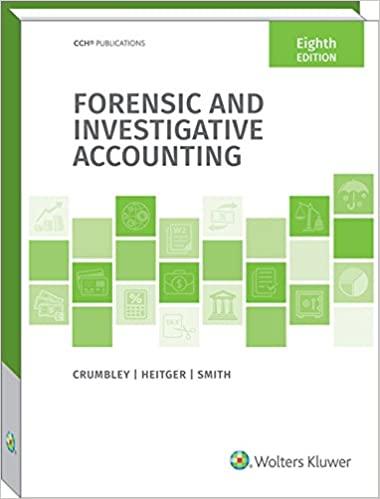Question
Customers as a Cost Object Morrisom National Bank has requested an analysis of checking account profitability by customer type. Customers are categorized according to the
Customers as a Cost Object
Morrisom National Bank has requested an analysis of checking account profitability by customer type. Customers are categorized according to the size of their account: low balances, medium balances, and high balances. The activities associated with the three different customer categories and their associated annual costs are as follows:
| Opening and closing accounts | $300,000 |
| Issuing monthly statements | 450,000 |
| Processing transactions | 3,075,000 |
| Customer inquiries | 600,000 |
| Providing automatic teller machine (ATM) services | 1,680,000 |
| Total cost | $6,105,000 |
Additional data concerning the usage of the activities by the various customers are also provided:
| Account Balance | |||
| Low | Medium | High | |
| Number of accounts opened/closed | 22,500 | 4,500 | 3,000 |
| Number of statements issued | 675,000 | 150,000 | 75,000 |
| Processing transactions | 27,000,000 | 3,000,000 | 750,000 |
| Number of telephone minutes | 1,500,000 | 900,000 | 600,000 |
| Number of ATM transactions | 2,025,000 | 300,000 | 75,000 |
| Number of checking accounts | 57,000 | 12,000 | 6,000 |
Required:
1. Calculate a cost per account per year by dividing the total cost of processing and maintaining checking accounts by the total number of accounts. Round your answer to the nearest cent.
What is the average fee per month that the bank should charge to cover the costs incurred because of checking accounts? Round your answer to the nearest cent.
2. Calculate a cost per account by customer category by using activity rates. Round your answers to the nearest cent.
| Cost Per Account | |
| Low | |
| Medium | |
| High |
|
3. Currently, the bank offers free checking to all of its customers. The interest revenues average $90 per account; however, the interest revenues earned per account by category are $80, $100, and $165 for the low-, medium-, and high-balance accounts, respectively. Calculate the average profit per account (average revenue minus average cost from Requirement 1). Round your answer to the nearest cent.
Also calculate the profit per account by using the revenue per customer type and the unit cost per customer type calculated in Requirement 2. Round to the nearest cent. Use the minus sign to indicate a loss.
4. After the analysis in Requirement 3, a vice president recommended eliminating the free checking feature for low-balance customers. The bank president expressed reluctance to do so, arguing that the low-balance customers more than made up for the loss through cross-sales. He presented a survey that showed that 50% of the customers would switch banks if a checking fee were imposed. Explain how you could verify the presidents argument by using ABC.
First, calculate the profits from loans, credit cards, and other products by customer category (using ABC data). Next, compare 50% of the cross-sales profits from low-balance customers with the total loss from the low-balance checking accounts. If the cross-sales profits are greater than the loss, the presidents argument has merit.
Step by Step Solution
There are 3 Steps involved in it
Step: 1

Get Instant Access to Expert-Tailored Solutions
See step-by-step solutions with expert insights and AI powered tools for academic success
Step: 2

Step: 3

Ace Your Homework with AI
Get the answers you need in no time with our AI-driven, step-by-step assistance
Get Started


